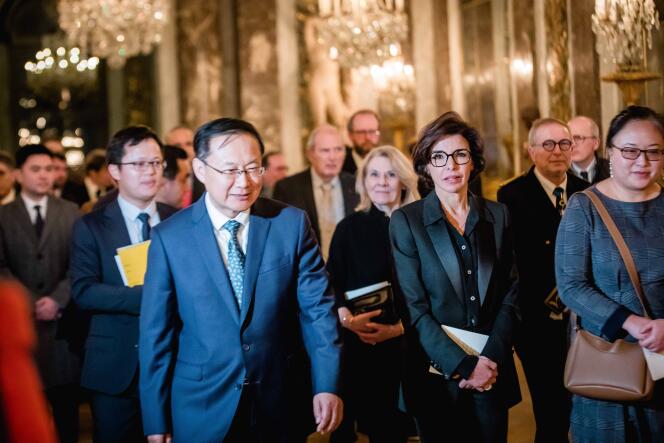


On Wednesday, January 31, at 8 pm, Emmanuel Macron's face appeared on the big screen of the Royal Opera House in Versailles. Here, 600 guests awaited the start of the 60th anniversary celebrations of French-Chinese diplomatic relations and the French-Chinese Year of Cultural Tourism. "The mutual openness of our two nations is indispensable," said the French president. "We must persist in expanding the cake, gathering cooperation forces through openness and sharing development opportunities," echoed his Chinese counterpart Xi Jinping, in a speech, which was also filmed.
This staging of French-Chinese friendship, which culminated in a concert given by China's National Traditional Orchestra and the Château de Versailles' Royal Opera, dispensed with toasts and accolades. It boiled down to a single motto: "the central role of culture in our bilateral relationship," according to French Culture Minister Rachida Dati, as well as to an objective openly expressed by her Chinese counterpart, Sun Yeli: the revival of tourism, which has been slow to return to pre-Covid-19 levels.
According to a French diplomat who wished to remain anonymous, "the theme selected to celebrate the 60th anniversary was cultural tourism because we had nothing else to get our teeth into." To attract foreigners – including the French – the Chinese authorities have announced a visa exemption for stays lasting less than 15 days.
There are no plans to reciprocate on the French side. However, to rekindle a "yearning for France" among the Chinese, almost 200 cultural events have been planned for 2024, including an exhibition devoted to the Château de Versailles in Beijing's Forbidden City, and tours by the Comédie-Française, the Bordeaux Opera Ballet and French musicals in various Chinese cities. The Mobilier National is taking two exhibitions abroad: "Palais Disparus de Napoléon" ("Napoleon's Lost Palaces") in March, in Beijing and Shanghai, followed by "Le Chic! Decorative Arts and French Furniture," in partnership with the private audiovisual group Hantang. "It took us a long time to use the word 'interest', a term the Chinese use openly," said Eva Nguyen Binh, president of the Institut Français. "Today, we embrace it: We have an interest in maintaining mutual understanding."
This interest is weighed down by ethical and political considerations. Xi's regime has grown tougher since the pandemic. In 2020, Beijing introduced a draconian national security law in Hong Kong and stepped up military pressure on Taiwan, which it has vowed to bring back into its fold. Moreover, repression of the Uyghurs, the Turkish-speaking minority living in the west of the country, has continued unabated. Artificial intelligence now makes it possible to monitor every citizen at all times. Censorship is rife at all levels. "It's suffocating – You don't have no fresh air, and it's hard to breathe," the Chinese dissident artist Ai Weiwei told the British daily The Independent in July 2023. He has not returned to China for nine years.
You have 80% of this article left to read. The rest is for subscribers only.
